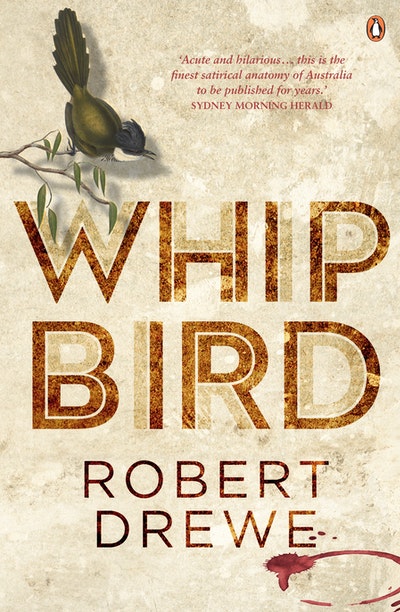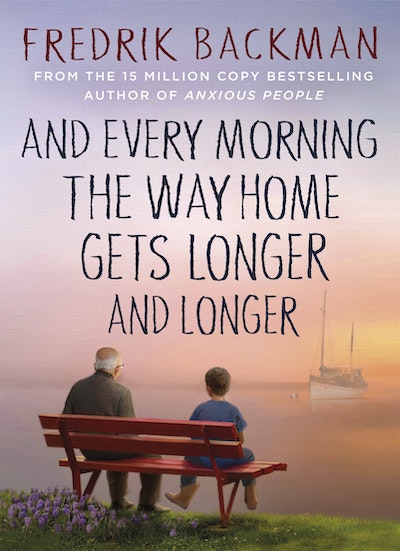- Published: 30 July 2018
- ISBN: 9780143791942
- Imprint: Penguin
- Format: Paperback
- Pages: 320
- RRP: $22.99
Whipbird
Extract
A rich cloud of meat smoke drifting slowly across the grapevines and paddocks greeted the members of the Cleary family as they arrived at the vineyard. The tasty mist from a dozen barbecues billowed over the house – the ‘homestead’, as Hugh Cleary called it – and the stable and the rammed-earth wine cellar, and above the rows of newly planted pinot noir vines, and curled up into the blue gums and manna gums bordering the creek.
Now he believed he was a dead person, Hugh’s younger brother Simon ‘Sly’ Cleary peered out of the car window at the gaunt new vines and wondered how long he’d be spending in this gravelly realm between heaven and hell. In the eyes of the former keyboard player for Spider Flower, suffering a delusionary mental belief that he’d lost his vital organs and no longer existed, perhaps this particular phase was Purgatory.
Before it dispersed over the creek, the smoke of Sly Cleary’s imagined afterlife also wound slowly around Hugh, the tense and beaming host, busy with his father Mick, his son Liam, and his cousin Father Ryan Cleary in directing the car-parking.
Two dry and tussocky home paddocks yet to be planted with vines had been set aside for parking and for those who’d chosen camping as an alternative to motel accommodation in town. And as more and more cars arrived, and tents were erected, the chatter and bustle grew and a pale dust cloud rose and merged into the denser meat smoke that hung over the paddocks.
In the humid absence of a significant breeze, the smoky haze wafted above racing, shrieking and already-flushed children, and over clumps of earlier arrivals tucking into the wine and beer, their snatches of laughter carrying across the paddocks and vines, and drifted over a young tattooed couple having sex in the bushes by the creek.
More vehicles arrived. Car doors slammed and newcomers shouted greetings. People hugged and kissed and patted kids’ heads. Five or six dogs, stimulated to ravenous skittishness by the smoke’s meaty odours, chased each other from group to group, bounding and yapping and running in frenzied circles.
There was a reason for all this excited activity. In Hugh and Christine Cleary’s vineyard, Whipbird, in the foothills of Kungadgee, just outside Ballarat in the state of Victoria, the Cleary family planned to spend the weekend celebrating the 160th anniversary of its presence in Australia.
To any wet blankets who might have considered a 160th anniversary somehow lacked the neat appeal of a centenary or a sesquicentenary celebration, Hugh’s invitation, sent out six months previously, had pointed out that the family’s centenary in 1954 was so long ago that not many of them were around to participate. And in 2004 the 150th had somehow slipped by unnoticed.
Now that his new vineyard provided the perfect venue, he believed the family should seize the day (the unstated message in the invitation being that so many of them, himself for example, were doing so much better in their various endeavours than they were in 2004) and duly celebrate the arrival of their ancestor Conor Cleary in Melbourne in 1854.
Most of Conor’s descendants agreed that an open-air celebration suited the occasion and the sunny weekend they hoped for as Ballarat’s spring made its jerky transition into summer. As did the earthy surroundings of a winery. And somehow a mouthwatering haze of grilling beef, pork, lamb and chicken, the sizzling aroma of outdoor-cooked animal protein, overlaid and entwined with the pungency of frying onions, seemed especially Australian. And after all, the weekend’s party was essentially a celebration of their being Australian.
Of course a few vegetarians, notably Hugh’s sister Thea (no surprises there, Hugh thought), had argued for lighter al fresco catering by Agrarian Revolution, which had recently been awarded one chef’s hat in the Best Regional Vegetarian Food category of the Good Food Guide. After some grumbling, a charge of a hundred dollars for vegetarian and carnivore family groups alike was suggested by Hugh, whose own financial outlay for the weekend – as well as being the hosts, Hugh and Christine were among the wealthiest descendants – was heading towards many thousands of dollars.
The charge was eventually agreed on as an acceptable expense for such a significant occasion. (As Hugh reckoned, ‘A hundred bucks would go nowhere at Florentino or Matteo’s.’) And for one lasting an entire weekend: to help cover the catering by Posh Nosh and Agrarian Revolution, the meat, the salads, the bakery goods, the wine he’d arranged from Manimbla Estate (his own vines hadn’t yet begun producing), the beer, the local serving staff, the hire of portable barbecues (including hotplate appliances, a skewer grill and a gas spit roaster) and furniture and toilets and a children’s inflatable playground (a bouncy castle, octopus, crab and giraffe), the band of young musicians for Saturday night, and the professional photographer from Ballarat’s Brides & Babies – not that a photographer was necessary, as Christine pointed out, ‘with a phone in nearly every hand’.
All food preferences were thereby satisfied, and the vegetarian women kept a wary eye on the meat smoke so it didn’t blow into their hair and clothes.
Slung between two blue gums at Whipbird’s entrance, a vinyl banner especially made by Signs ‘R Us to Mick Cleary’s instructions, in the black and yellow Richmond Tigers colours, proudly announced to the arriving descendants: The Cleary Family 1854–2014.
Of a possible 2946 direct Cleary descendants, 1193 of them (including partners) had turned up to Whipbird, from two nonagenarians to scores of toddlers and babies, from all over Victoria and every other Australian state, and even a handful from overseas, attracted by public notices Hugh had placed in The Age, The Australian, the Sydney Morning Herald and the West Australian, and relayed onwards by digital technologies, inviting them – urging them – to Kungadgee, 20 kilometres from Ballarat, to celebrate the 160 years since fifteen-year-old Conor Cleary, three months out of the port of Cork on the Jupiter, stepped ashore in Melbourne.
It was unlikely that the adolescent Irish virgin would have envisaged his huge personal dynasty – all those first, second and third cousins; the nephews and nieces and great-aunts – not to mention a celebration of his line occurring in the far-off 21st century. But it was a safe bet that the hungry boy would have voted for the paleo menu – the barbecued porterhouse and T-bone steaks, the pork sausages, the beefburgers and shish kebabs, the grilled chicken breasts and thighs, even the elegant little French lamb cutlets with their paper tutus – over Agrarian Revolution’s kale, quinoa and zucchini fritters, and the basil and bocconcini skewers.
As for the women Conor had married – for the anniversary reunion should acknowledge the wives’ genes, their mitochondrial DNA, in the dynasty as well – both the first two, the former Mary O’Hara and Bridget Meagher, refugees like their husband from Templemore in Tipperary, would certainly have favoured a tasty meat meal, as mothers of seven and eight young Clearys respectively and seldom without a baby sucking the energy and protein out of them.
Although the family birthrate had standardised by the 21st century, with all those antipodean Clearys coming into the world in the 1860s, ’70s and ’80s, and the big Catholic broods they’d produced in their turn in the 20th century, it was no wonder that by Saturday 29 November 2014 the new vineyard at Kungadgee (kungadgee! meaning goodbye! – being the word most emphasised by the Indigenous Wathaurong people to the region’s first Europeans) was packed from creek to homestead with vividly dressed descendants of Conor and Mary Cleary, and Conor and Bridget Cleary.
As each descendant family arrived at Whipbird they checked in to a yellow-and-black striped marquee (Tiger colours, Mick’s doing, again), ticked off their presence, were allotted a table or tables in the paddock, and then added the names of any recent additions in their ranks to the lists overseen and pinned on a noticeboard by an increasingly flustered Christine Cleary and her twin fourteen-year-old daughters Olivia and Zoe, all becoming rattled by the sheer numbers of Cleary offspring facing them.
In the required red T-shirts were Hanrahans galore; throngs of Caseys were fluorescent in apple green. The Kennedys had been instructed to wear pale blue; the O’Donnells, Brunswick green; the (Presbyterian) Donaldsons, orange; the L’Estranges found themselves fortunate with white; the O’Learys had turquoise; the Opies, maroon; the Fagans, gold; the Godbers, electric blue; and the McMahons, grudgingly, wore purple.
And these were only some of the families and colours on hand. Meanwhile, those Cleary descendants actually named Cleary were, on Mick’s say-so, allocated T-shirts in the Richmond football team’s by now rather overwhelming black and yellow.
As well as hectic school-age children, there were squirming, excited toddlers, and scores of babes in arms, and in strollers, prams and carrycots as well. Young fathers harnessed to papoose carriers and juggling drinks over their child-laden stomachs made an effort to stay cheery and avoid dripping shiraz on their babies’ heads.
‘Far out!’ Olivia muttered to her sister. ‘These women need to get on the pill or stop doing it.’
‘It’s tripping me out,’ Zoe said.
For those who’d obeyed Christine’s instructions and worn the appropriate-coloured T-shirt came a swift kiss on or near the cheek. Those who’d flouted her directive, especially the six bandana-wearing Sheens who, intending to replicate the clothing of an Irish immigrant stepping off a boat in 1854, had, confusingly, come dressed as pirates, received an icy smile and a longer wait than the others for their registration to be completed.
However, one incorrectly dressed, lank-haired and haggard visitor, wearing a baggy old woollen overcoat in a herringbone pattern and led along in his worn alligator-skin cowboy boots by a young aqua-haired woman, was swiftly ushered, though definitely unkissed, through the registration process.
As he passed through, Zoe whispered, ‘Check out the old scarecrow.’
‘Oh my God, Nightmare on Elm Street,’ said Olivia.
‘That’s your Uncle Simon. And your Cousin Willow,’ their mother muttered. ‘There’s a lesson there.’
The twins gaped as the spectral figure moved slowly into the crowd. A skeleton in a coat. They remembered overheard adult conversations about their father’s unconventional younger brother, their seldom-seen musician-uncle Simon, and his rare psychiatric condition, the rock’n’roll and drug whispers sparking their attention before the talk was abruptly halted.
Any coolness factor vanished at the sight of him. No wonder he was the disapproved-of member of the family. Who lived in a hippie rainforest somewhere. An invalid, something schizo apparently, and judging by his scabby clothes obviously depressingly poor. And Willow’s hair was, like, a total fail.
Their wake was instantly filled by the jostling mob: grizzling babies, skidding children, and old people in bright, ill-fitting T-shirts who shouted effusive greetings as they hugged, and shook each other’s knotted hands, and tottered off into a landscape that appeared to the twins to be a merged mass of dull parent and grandparent types. A sea of bare pink skulls and grey hair and unfashionably gaudy and shapeless casualwear. And six pirates.
The girls looked at each other. These people were actually their relatives?
Whipbird Robert Drewe
No holds are barred as the Cleary family attempts to put long-held tensions behind them to celebrate a milestone. What could possibly go wrong?
Buy now











